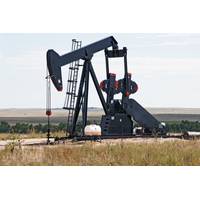Oil Approaches $80 a Barrel

The oil price rallied towards its highest level this year on Wednesday, after a drop in U.S. crude inventories and as the prospect of the loss of Iranian supply added to concerns over the delicate balance between consumption and production.Brent crude futures were last up 41 cents on the day at $79.47 a barrel by 1323 GMT, having touched a session peak of $79.66, the highest since late May, when the price pushed above $80. U.S. crude…
US Crude Hits Highest Since 2014

Oil prices jumped on Wednesday, hitting their highest in more than three years on Wednesday after Saudi Arabia said it intercepted missiles over Riyadh and U.S. President Donald Trump warned Russia of imminent military action in Syria.Both U.S. crude and global benchmark Brent traded at the highest levels since 2014 as geopolitical concerns overshadowed a surprise build in U.S. crude inventories."A bearish inventory report was quickly negated on word of intercepted rockets over Riyadh…
Oil Edges Up But U.S.-China Trade Tensions Weigh
Trade dispute between U.S./China unsettles markets as U.S. drillers add 11 rigs drilling for new oil. Oil markets stabilised on Monday after having lost around 2 percent last Friday as concerns grew over the impact on global growth from an intensifying trade dispute between the United States and China, as well as increased U.S. drilling activity. Markets were also eyeing the situation in Syria after reports - denied by the Pentagon - that U.S. forces had struck a major air base there.
Oil at One-Month High after U.S. Missile Strike
Syria missile strike bears no impact on oil market fundamentals; two Canadian oil sands producers cut output after fuel shortage. Oil prices hit a one-month high on Friday after the United States fired missiles at a Syrian government airbase, sending shockwaves through global markets and raising concerns that the conflict could spread in the oil-rich region. The toughest U.S. action yet in Syria's six-year-old civil war has ramped up geopolitical uncertainty in the Middle East.
Saudi Oil Minister: No 'Free Rides' for Non-OPEC Producers
Saudi Oil Minister Khalid al-Falih said on Tuesday that oil market fundamentals are improving as an agreement to curb supply by OPEC and non-OPEC producers took effect. But he said the group would not let rival producers take advantage of the cuts to underwrite their own production investments. Saudi Arabia had cut beyond what it had pledged in the agreement and brought the kingdom's output below 10 million barrels per day, he said.
Oil Steady as Markets React to Trump Win
Markets shake off initial shock over Trump victory. Trump seen as friendly to oil, gas industry, but oil market fundamentals remain weak. Oil prices steadied on Thursday as markets recovered from their initial shock at U.S. President-elect Donald Trump's surprise victory, but investors were cautious ahead of a key OPEC meeting to decide on production. Most markets shook off post-election losses and bounced back on Thursday. But the…
1st Meet of the High-level Committee of Algiers Accord
The OPEC High-level Committee, established by the Algiers Accord, met with non-OPEC oil producing countries on Saturday, 29 October, at OPEC headquarters in Vienna. It was preceded by the first High-Level Committee Meeting, held Friday, 28 October, among OPEC Member Countries. In addition to OPEC Member Countries, six non-OPEC countries attended the joint Meeting. They were Azerbaijan, Brazil, Kazakhstan, Mexico, Oman and the Russian Federation.
OPEC, Key Producers to Discuss 6-month Oil Deal
OPEC will hold talks with non-member oil producers on Wednesday in a bid to hammer out details of a global agreement to cap production for at least six months as Russia lent its support for the plan. Ministers from OPEC members embarked on a flurry of talks at an energy conference in Istanbul to shore up support for the OPEC deal they agreed in Algeria last month hoping to adopt it at the end of November. Oil prices that have more than halved since mid-2014 as global supplies swelled.
Saudis: Long-Term Oil Market Fundamentals Robust
Long-term oil market fundamentals remain robust but prolonged low prices could threaten security of supply and pave the way for a price spike, Saudi Arabia's vice oil minister said on Monday. The world's largest crude exporter will continue investing in its oil and gas sector, Prince Abdulaziz bin Salman said. "For a major reserve holder, oil producer and exporter such as Saudi Arabia, our focus has always been on the long-term trends shaping the oil market…
Oil Up on Kuwait Minister Remarks
Both crude oil benchmarks trade close to $50 a barrel. Kuwait oil minister tells Reuters he sees prices rising. Oil prices rose on Monday after Kuwait's oil minister said economic growth and the removal of high-cost producers would help tighten global fuel balances and OPEC forecast more demand for its oil next year. Ali al-Omair told Reuters the Organization of the Petroleum Exporting Countries would stick to its output policy, which has focused on building market share at the expense of higher cost non-OPEC producers.
OPEC Sees Higher Demand for its 2016 Output
OPEC Joins IEA in saying non-OPEC supply to fall in 2016. OPEC forecast on Monday that demand for its oil in 2016 would be much higher than previously thought as its strategy of letting prices fall hits U.S. shale oil and other rival supplies, reducing a global surplus. In a monthly report, the Organization of the Petroleum Exporting Countries (OPEC) forecast the world would need 30.82 million barrels per day (bpd) from the group next year, up 510,000 bpd from the previous prediction.
Oil up 2 pct as U.S. Drilling Falls
Crude oil benchmarks up more than 1 percent; output to fall by 255,000 bpd from Q2-Q4 2015. Oil rose by more than 2 percent on Monday after data showed U.S. drilling slowed and a report said $1.5 trillion worth of planned production was uneconomic at current prices. Crude has halved in value over the last year as soaring global production overwhelmed slowing demand and the much lower prices have now begun to hit drilling, particularly in the United States. U.S.
OPEC: Crude Demand will Grow in 2016
OPEC on Monday predicted higher demand for its crude oil next year, sticking to its view that a strategy of letting prices fall will tame the U.S. shale boom and cut a global surplus. The monthly report from the Organization of the Petroleum Exporting Countries also said a weaker outlook for China would contribute to slower global oil demand growth next year. "U.S. oil production has shown signs of slowing," OPEC said in the report.
OPEC: Higher 2016 Demand for its Output
OPEC on Monday predicted higher demand for its crude oil next year, sticking to its view that a strategy of letting prices fall will curb supply from the United States and other rival producers. The monthly report from the Organization of the Petroleum Exporting Countries, however, trimmed its estimate for 2016 global oil demand growth and predicted a less dramatic slowdown in non-OPEC supply than the International Energy Agency.
Oil Leads Market Rout as Asian Shares Tumble
Commodities pulled down by tumbling Asian equities; Oil, coal, copper at 2009 financial crisis levels. Commodity markets lurched lower on Monday after Chinese equities resumed their slide, fuelling worries of a hard landing in the world's biggest consumer of raw materials. Crude oil tumbled to its weakest levels in 6-1/2 years while industrial metals prices also hit multi-year lows amid a broad sell-off of risky assets. Investors…
Oil Plunges 4 pct to 6-1/2-year Low on China
U.S. crude reaches lowest point since February 2009; China equities collapse sparks global markets sell-off. Oil prices fell more than 4 percent to fresh 6-1/2-year lows on Monday after Chinese stock markets suffered their biggest one-day drop since the global financial crisis, intensifying worries over the outlook for global oil demand. Inaction by the Chinese government following an 11 percent rout in local stock markets last week encouraged a free-fall in global equities and other commodities on Monday.
Oil Up on China, Greece News; Demand Worries Weigh
Oil prices set to come under further pressure. Market awaits news on Iran nuclear talks. LONDON, July 10 (Reuters) - Oil prices rose on Friday, lifted by a rebound in Chinese stock prices and hopes of a breakthrough in the Greek debt crisis, but worries about oversupply and slowing demand limited gains. Brent crude oil was up 56 cents at $59.17 a barrel by 1100 GMT. So far this month, the international benchmark has lost more than 7 percent. Front-month U.S. crude futures were trading around 57 cents higher at $53.35 per barrel.
Oil's Bull Run Hides a Deep Disconnect, Crude Traders Warn
While oil futures prices rebound with vigor as analysts cite strong demand, the physical crude market tells a much more cautionary tale. Tens of millions of barrels are struggling to find buyers in Europe with traders of West African, Azeri and North Sea crude blaming poor demand. The deep disconnect between the oil futures and physical markets looks similar to the events of June 2014 when the physical market weakness became a precursor for a futures price crash.
Rosneft Slams OPEC, Warns on Possible Oil Shortage
The head of top Russian oil producer Rosneft criticised OPEC policy on Tuesday and warned lower oil output as a result of falls in crude prices may lead to a supply shortage as early as the fourth quarter. Oil prices collapsed in 2014 in a decline that deepened after the Organization of the Petroleum Exporting Countries, a producer group of which Russia is not a member, in November chose not to cut its own output. "OPEC has lost its teeth…
PIRA's Latest Weekly Oil Market Recap
NYC-based PIRA Energy Group reports that accounting for the strength of U.S. jet fuel demand this summer. In the U.S., stock excess accelerates. In Japan, stocks draw, but finished product stocks continue to rise. Accounting for the Strength of U.S. Jet fuel demand spiked in June, July and early August. Because the economy's fundamentals do not support such a high level of domestic demand, we suspect that higher than currently assumed exports will result in a revision downward of the final demand numbers.
